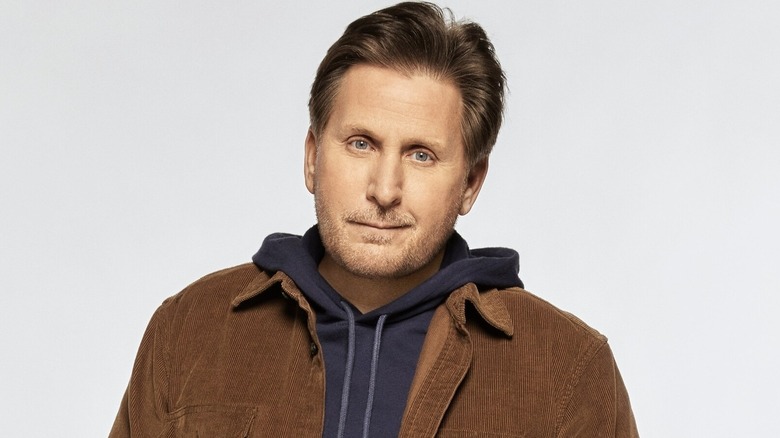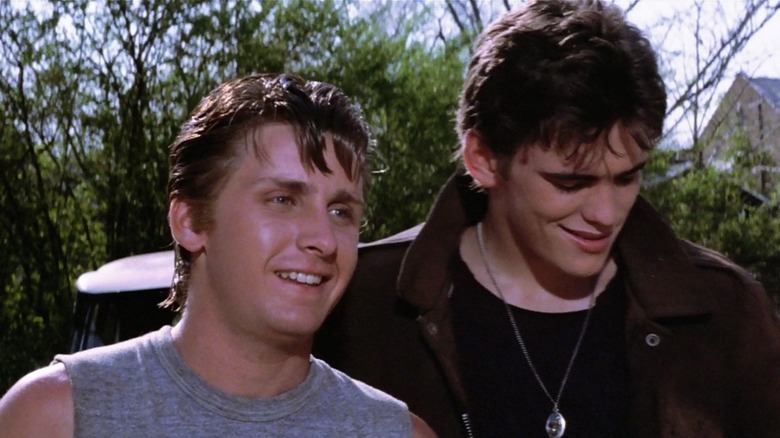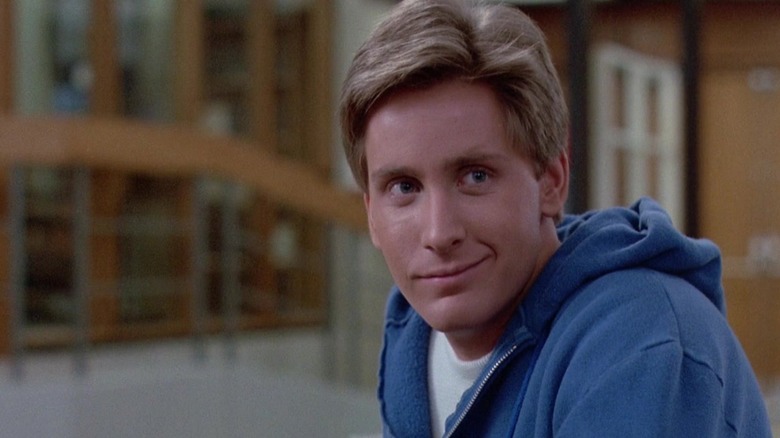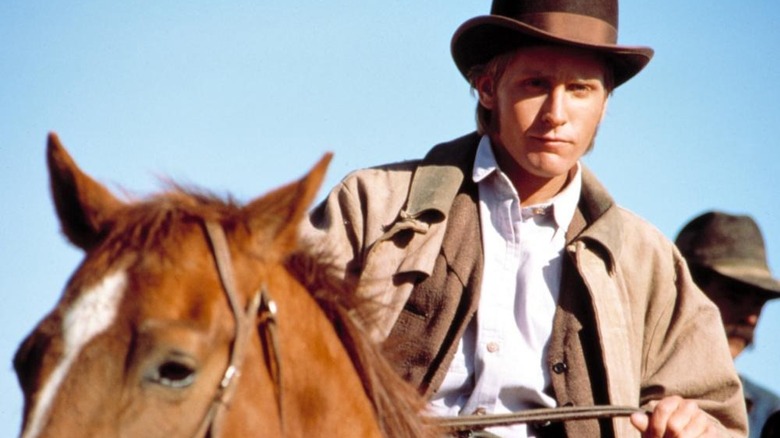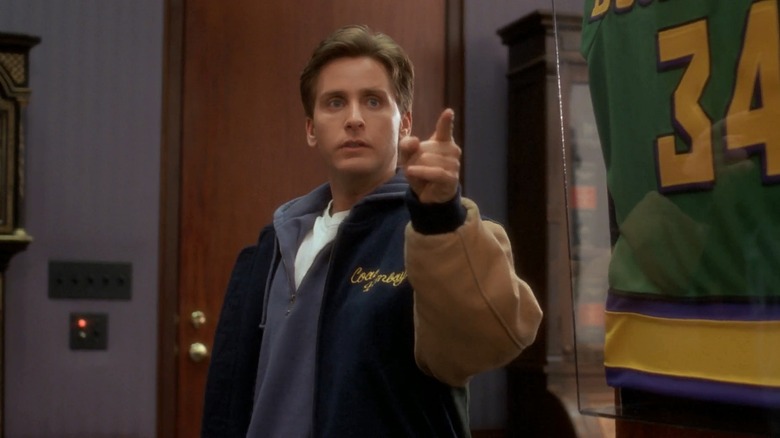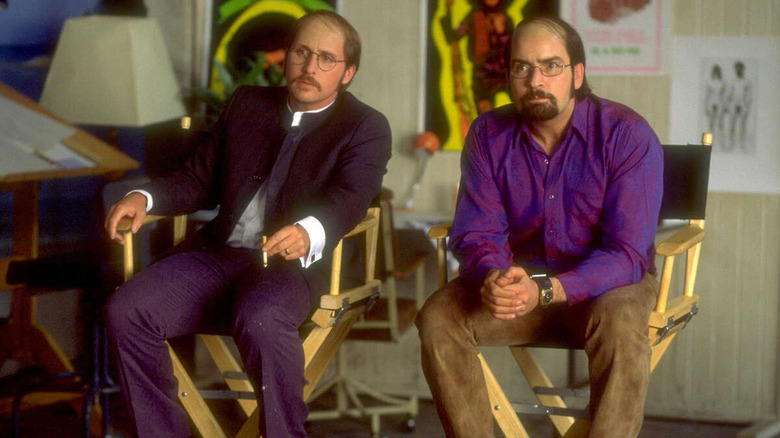Why Emilio Estevez Disappeared From Hollywood
Emilio Estevez made his big screen debut at the age of 11 in the film "Badlands," Terrence Malick's mood drama starring Emilio's father Ramón Estévez, who was better known by his screen name Martin Sheen. When Emilio was 14, he flew with his father to the Philippines for another film shoot. Sheen was playing the lead role in Francis Ford Coppola's "Apocalypse Now," and the young Emilio was hired to appear as an extra. Sadly, his scenes were cut, but Estevez was inspired by his experience to write a play called "Echoes of an Era," and perform in the lead role. He was officially an actor like his father.
After graduating high school, Estevez eschewed college and entered show business. What followed was a decades-long and prolific career that brought him into the center of the Hollywood mainstream. In the 1980s, Estevez was part of a generation of rising actors referred to in the press as the Brat Pack. He was part of the changing face of Hollywood.
In the late 1990s, though, Estevez's presence in front of the camera began to decline. He had written and directed in films where he was also the star, but eventually began to appear only as a minor member of his own ensemble movies. As of this writing, his last directorial effort was 2018's "The Public," which also starred Jeffrey Wright, Jena Malone, Christian Slater, Gabrielle Union, and Michael K. Williams.
Why did Estevez stop acting? This author recalls an interview Estevez conducted with the L.A. Weekly in 2006 (sadly, not available online) wherein the actor admitted quite openly: "I didn't stop working on purpose." It's not that Estevez left Hollywood, it's that Hollywood lost interest in him.
Emilio Estevez's meteoric rise
Two years after graduating from high school, Estevez landed the small role of Johnny in Tim Hunter's "Tex," a film adapted from the novel by S.E. Hinton. "Tex" also starred Matt Dillon, Meg Tilly, and Jim Metzler. The film was distributed by Walt Disney Productions, at a time when the company was struggling to keep its kid audience, and was forced into making more adult fare.
It may have been Estevez's association with both Dillon and with S.E. Hinton that landed him the role of Two-Bit in Coppola's 1983 drama "The Outsiders," one of the most important films of its decade. "The Outsiders" starred C. Thomas Howell, Ralph Macchio, Patrick Swayze, Rob Lowe, Tom Cruise, and Diane Lane, and boasted cameos from Nicolas Cage, Melanie Griffith, and Heather Langakamp. The film became the fertile soil out of which a whole new generation of stars began to emerge. It also featured Sofia Coppola, Flea, Tom Waits, and Leif Garrett, so it carried a new kind of oddball imprimatur.
It was "The Outsiders" that was eventually seen as the inaugural film of the Brat Pack, a group that included Estevez and Lowe among its "official" members. Estevez continued to work, appearing in an anthology horror movie called "Nightmares," and, more importantly, landing the lead role in Alex Cox's 1984 punk epic "Repo Man." That film is a wonderfully caustic middle finger to Reagan-era capitalism and "normalcy," and it drips with contempt. "Repo Man" was widely praised when it was released, and is now often considered to be one of the best films of the 1980s. It still regularly appears on the midnight movie circuit, and Estevez's fierce performance remains one of his best.
The Brat Pack era
The term "Brat Pack" wouldn't be coined until 1985, however, when it was invented by David Blum for a cover story in New York Magazine. That magazine pointed out that the Brat Pack was any lead actor who appeared in the films "St. Elmo's Fire," directed by Joel Schumacher, or "The Breakfast Club," directed by John Hughes. Estevez appeared in both, as did fellow Brat Packers Ally Sheedy and Judd Nelson. In the former, Estevez played Kirby, a waiter/law student in love with a medical intern (Andie McDowell), who already has a boyfriend. In the latter, he played Andrew Clark, a high school wrestler in detention for bullying another kid.
Estevez has a handsome face and projected an everyman quality that made him approachable. He also was capable of rage and outbursts that revealed a great deal of emotional depth. There's a reason he became the face of a new generation of actors.
In 1985, Estevez also appeared in another S.E. Hinton adaptation, "That Was Then... This Is Now," which he wrote, and the following year, he made his directorial debut with "Wisdom," a youthful criminals-on-the-run Robin Hood drama. "Wisdom" co-starred Demi Moore, another Brat Packer, as well as Tom Skerritt and Veronica Cartwright. Estevez cast his younger brother, Charlie Sheen, as an angry burger joint manager. Fans of Danny Elfman will note "Wisdom" as one of the composer's earliest features.
Estevez, meanwhile, was poised to be either a soulful indie director, or a major Hollywood star. He took the latter path first.
Emilio Estevez's goes Hollywood
In 1987, Estevez starred in John Badham's "Stakeout," a mainstream crime comedy that also starred Richard Dreyfus. "Stakeout" was made for a modest $14 million and earned over $65 million. This success matched a wild party lifestyle that came with being a member of the Brat Pack, and Estevez had several high-profile relationships that coincided with his rise. He was engaged to Moore for a while, before dating actress Mimi Rogers. He also dated model Carey Salley, and the pair had two children. Salley, however, had the kids while Estevez was dating Moore, and he was taken to court over his potential paternity. As scandals go, this one ranks low.
1988 saw the release of "Young Guns," a pop Western famous for its action and its unbearably attractive young cast. In addition to Estevez, the film starred Lou Diamond Phillips, Kiefer Sutherland, Dermot Mulroney, and Charlie Sheen. Estevez played Billy the Kid, the leader of the Regulators. Produced for just over $11 million, "Young Guns" grossed $56 million at the box office, making it a legitimate hit. Estevez became friends with Jon Bon Jovi, and the pair appeared in 1990's "Young Guns II," which was also a hit. The "Young Guns" movies were particularly substantial films for any girls between the ages of 12 and 15 in 1988, as they were sold as "cute boy" movies.
Estevez also wrote and directed the crass garbageman comedy "Men at Work" in 1990, which was lambasted by critics despite being a modest success.
The Mighty Ducks and Estevez's downturn
In 1992, Estevez signed on to the kid-friendly sports movie "The Mighty Ducks" for Disney. He played Gordon Bombay, an arrogant attorney who, as his community service following a DUI conviction, becomes the reluctant coach of a terrible kids' hockey team. "The Mighty Ducks" wasn't terribly well-reviewed, as it is clichéd and treacly. Its title was also seen as a bit silly, only embraced by Anaheim's official hockey team decades later. "Ducks" was, however, a notable success, making $50 million on a $14 million budget.
Like "Young Guns," "Ducks" was enjoyed by a specific age group, albeit a very young one. It spawned two sequels, "D2: The Mighty Ducks" and "D3: The Mighty Ducks" in 1994 and 1996, and a wholly unrelated animated series about anthropomorphic sci-fi duck hockey warriors in 1996.
"The Mighty Ducks," however, kind of signaled a downturn in Estevez's career. He was no longer a "wild child," but an adult actor looking for work just like anyone. He appeared in the two "Ducks" sequels, as well as the lambasted slapstick comedy "Loaded Weapon 1," and the less-popular sequel to "Stakeout," called "Another Stakeout." In 1996, Estevez attempted to return to directing with "The War at Home," wherein he starred opposite his father. Despite a cast that included Kathy Bates, Carla Cugino, and Kimberly Williams, "War" remained low-profile, making only $44,000 at the box office.
That same year, Estevez appeared in Brian De Palma's mega-hit "Mission: Impossible," but his character was killed early in the film. After that, Estevez was officially out of the Hollywood mainstream. It seems one cannot remain a "Brat" at age 34.
Estevez's directing career
As Estevez said, he didn't stop working on purpose. He fell out of the public's favor and casting directors stopped calling. As Estevez recalled painfully in a 2006 interview with the Guardian, he made a deal with Disney to appear in 1996 sequel "The Mighty Ducks 3" for "no money," in exchange for the studio financing and distributing his own feature, "The War at Home," that same year. "And then they [Disney] released the film in four theatres. The heartbreak of that almost forced me out of the business."
In the 1998 film "A Night at the Roxbury," Estevez's name was used as a punchline to a joke. Two club-going losers casually namedrop him, revealing that Estevez had reached a pathetic level of former fame. He was a has-been in the eyes of the public. He didn't leave Hollywood, and he wasn't kicked out, but it seems like he was shown the door.
Estevez, of course, wasn't ready to retire and sought additional directing projects. In 2000 he wrote, directed, and starred opposite his brother, Charlie Sheen, in "Rated X," a TV movie made for Showtime all about the Mitchell Brothers, who were stalwart warriors for strip clubs and porn in the 1970s and 1980s. This opened the door to other TV directing jobs, and Estevez helmed episodes of "The Guardian," "Cold Case," and "CSI: NY" throughout the early 2000s. In 2006, he returned to cinemas with the prestige project "Bobby," an ensemble drama about the day Robert Kennedy was assassinated, which was recognized by many film awards bodies.
Estevez directed "The Way" in 2010, another film he made with his father, as well as "The Public" in 2018. As a director, he has a very laidback sensibility, handling large groups of actors with magnificent aplomb. His films, however, are rarely flashy or stylish, so they rarely gain a lot of press.
In 2021, he returned to "The Mighty Ducks" with a low-profile TV series, knowing he was now forever connected to the franchise. He left after the show's first season.
These days, Estevez remains out of the public eye on purpose. In 2010, talking to Busted Halo, he said that he's bad at self-promotion and has "never been a guy who just went out there to get publicity on myself. I never saw the value in it." It seems he's happier leading a quiet life.
